Photos by Tony Powell
Rueben and Shivani Bajaj’s modern Potomac home was built around family, ritual and one very impressive garage.
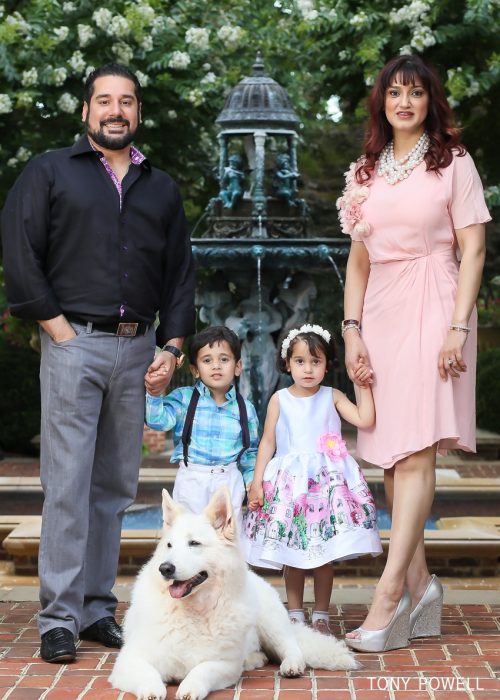
Rueben and Shivani Bajaj with their three-year-old twins Ken and Rayne, and their nine-year-old swiss Shepherd, Ivanka.
Rueben Bajaj denied his indian heritage when he was growing up, dodging questions about his background. Now, the principal of commercial real estate firm White Star Investments fully embraces it, citing three pillars of Indian tradition that he lives by: family, respect and food. Upon entering the “B” labeled gates to the Bajaj’s Potomac home, that dedication to family rings true. He and his Delhi-born wife Shivani live in a house adjoined to that of Rueben’s parents, tech millionaires Ken and Kavelle Bajaj. The couple wanted their three-year-old twins Ken and Rayne to grow up as close to their grandparents as possible. “We followed the tradition of living with the parents, but with a very independent american twist.” Rueben says. The two youngsters should have no trouble getting along on the 10-acre property in the company of the family’s seven dogs, and the dozens of chickens and peacocks housed in a large coop in the backyard. And that’s not to mention the 1,000-gallon exotic fish tank in the entryway. “We love animals,” Shivani explains.
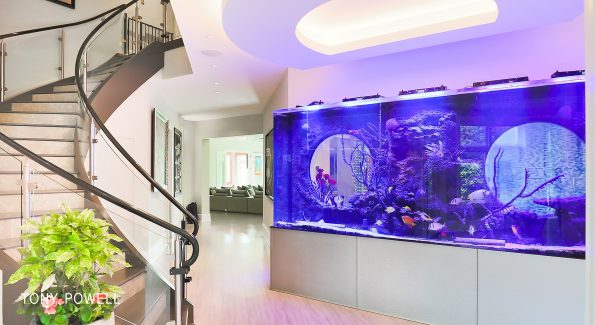
Rueben wanted to bring a taste of his favorite pastime of scuba diving home with the 1,000-gallon aquarium that sits in the entryway. It was a custom-built by Las Vegas- based acrylic tank manufacturing from the animal planet show “Tanked.”
The couple had what they refer to as a “partially- arranged” marriage six years ago, plotted by their mothers who are friends. Shivani was living in Delhi at the time helping with her family business, Orient Craft Limited, one of India’s largest garment producers, which supplies apparel to major U.S. brands like Gap, J. Crew and Ann Taylor. Eventually, Rueben’s charm won her over and she moved stateside.
After traditional Indian and American wedding celebrations, the couple enlisted locally-based Churilla Homes to build their custom 12,000-square-foot digs. Shivani says she developed European sensibilities growing up abroad, specifically a taste for quality Italian craftsmanship. So, when it came time to decorate, the Bajajs jetted to Italy with design teams from the U.S. and India in tow. They spent four days in Milan at the world renowned furniture fair Salone Internazionale del Mobile, scooping up the sleek modern pieces that now rest in each room. The weekend was an exhausting whirlwind, but worth the trip. All of the acquired custom furniture found a place, even a towering milky- hued murano glass chandelier, an impulse buy that was initially too big for the existing space. The solution? Raise the roof nine feet to make it fit. Naturally, things changed once the twins arrived. “All of our personal stuff got pushed aside,” Rueben jokes. Notably, Shivani transformed her beloved dusty pink-colored “orchid sitting room” into a play area for the kids. The child locks on her Minotti armoire say it all. Rueben designed a fully functional home office so that he could spend more time with the little ones. His soundproof man cave, accessible only via a hidden automated door, along with the underground 14-car garage, are the only spaces where Shivani, the driving force behind the overall design aesthetic, completely handed over the reigns.
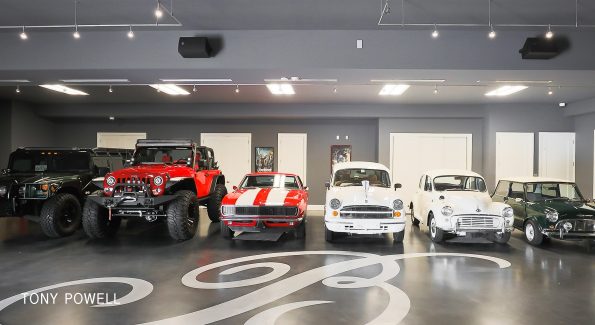
Rueben built the “garage of his dreams,” for his prized automobiles, which all have back stories. The Hindustan Motors car was gifted to him by his father-in-law and is the first of its kind on U.S. soil. It took a letter from the Smithsonian to help cut through customs’ red tape with the quid pro quo that they could access the car for exhibits.
Working in conjunction with the Florida-based design firm Collins & Dupont, they wanted to create a place that was “contemporary, yet homey.” Shivani explains: “If you walk through our home you will see that it’s done with a lot of love and care–every little piece that you ask me about, I can tell you a story about.” Amid all the bells and whistles, one-of-a- kind pieces of pop art and state of the art technology, the real attraction is the breezeway that connects the grandparents with their grandchildren and the countless family photos that adorn the walls.
It’s those elements that elevate the house into a home. “Everything i do is for the family. We do everything as a family,” Rueben says. “There is no hierarchy.”
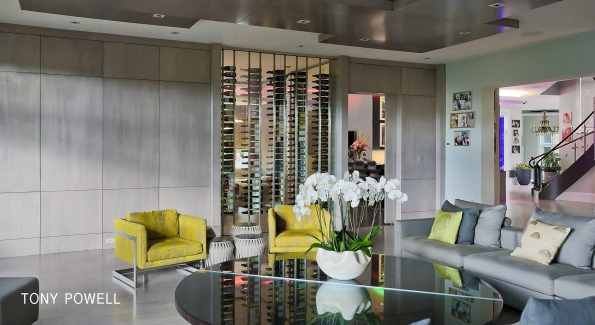
A large circular Giorgetti coffee table in the living room is flanked by a custom Italian-made sectional and two Minotti side chairs.
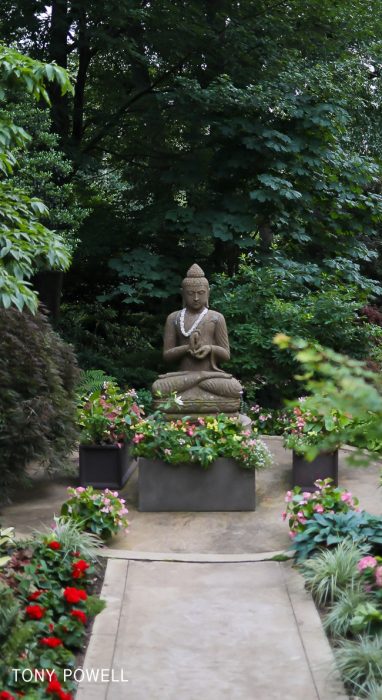
Lush gardens engulf the 10-acre property, a passion of Rueben’s mother Kavelle. A 1,000-pound Buddha statue sits in the backyard and represents serenity.
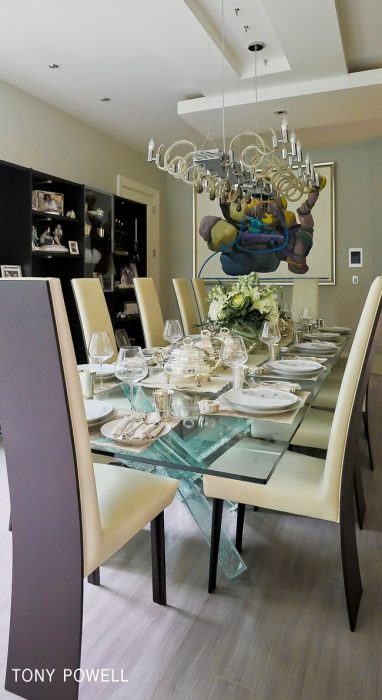
The family loves to play host in the formal dining room. The clay figure painting is by American artist Peter Opheim. The glass table is Reflex and the light fixture is Murano glass.
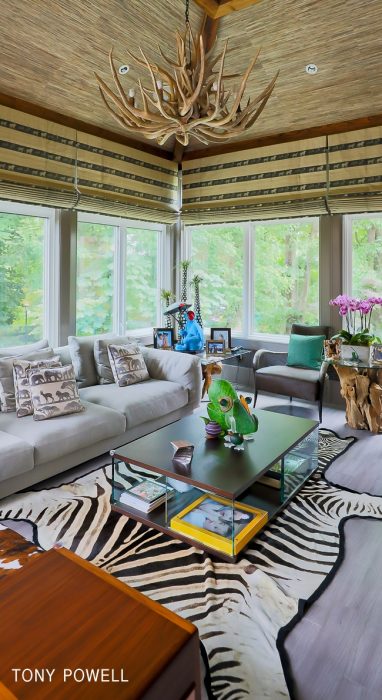
The “Jungle room” is meant to have an “African hunting lodge feel,” inspired by a safari Rueben took in south africa. The chandelier is made of naturally fallen elk horns. The ceiling is lined with real grass reeds and vaulted with barn wood from a farm in Pennsylvania.
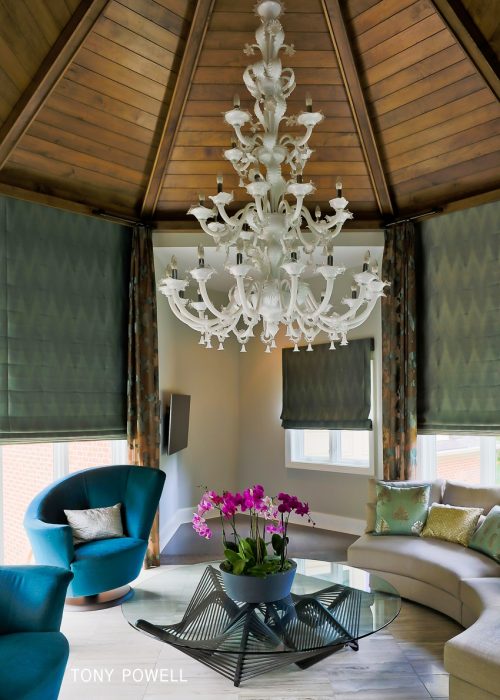
The Bajajs raised the ceiling to fit a Murano glass chandelier Shivani fell in love with.
This article appeared in the Summer 2018 issue of Washington Life Magazine.




